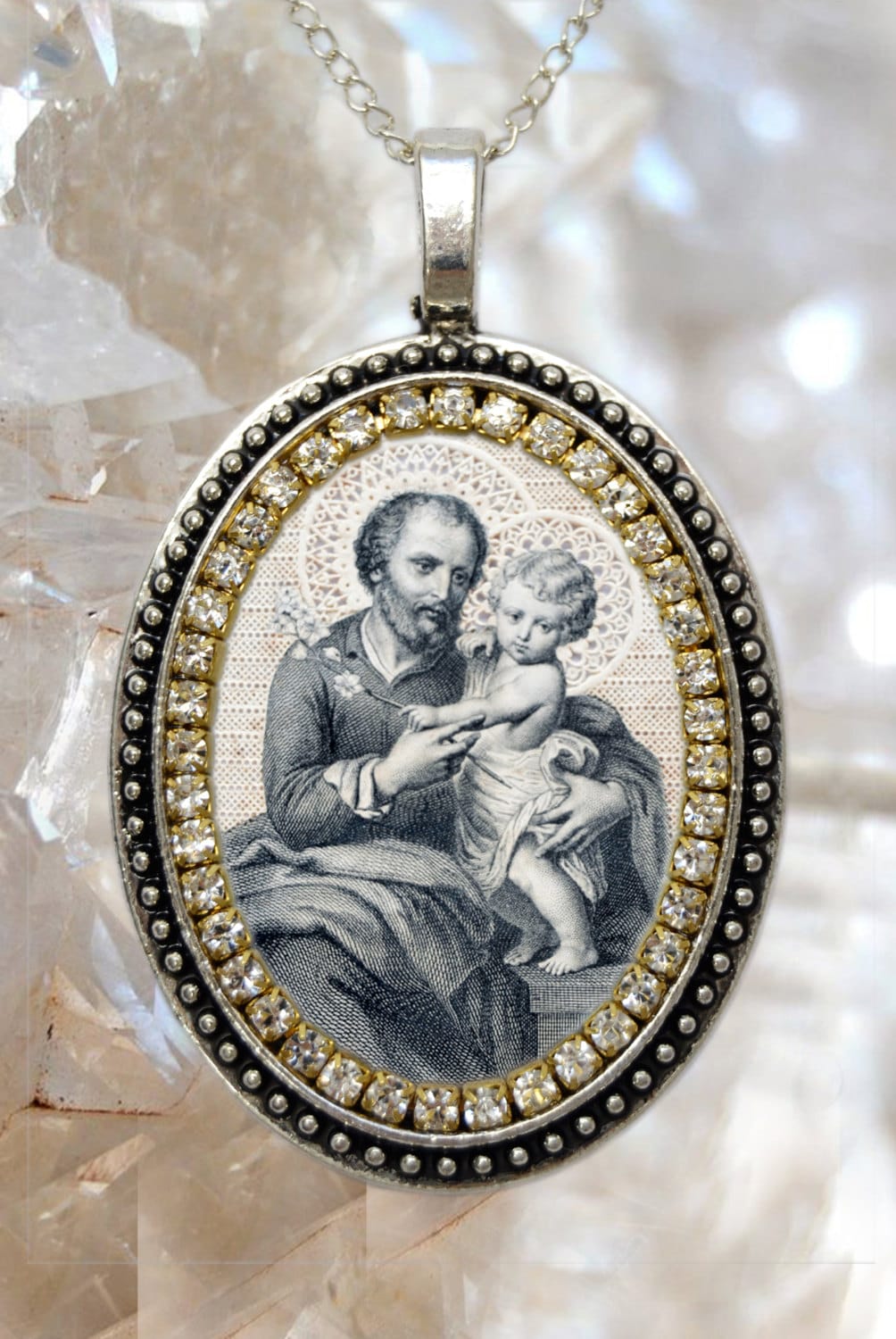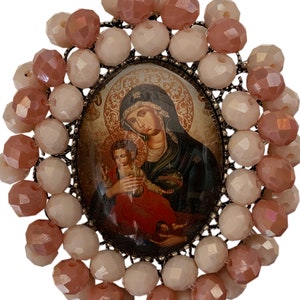



St. Joseph Vintage Style Handmade Necklace Catholic Christian Religious Jewelry Medal Pendant São José
$48.12 $60.16
(5)
-
Details- Saint Joseph
. I created this unique and meaningful necklace designs in honor of Saint Joseph.
Express your faith and devotion with this handmade necklace, it's a very powerful piece and a true gift for yourself or someone special.
. Created With:
Beautiful 57x37mm pendant with image of Saint Joseph adorned with clear rhinestones.
This necklace comes with chain.
Materials: Rhinestones & Metal
- All medals come with prayer
. Please note: This Necklace its handmade by hands that love to create and use their work to inspire people.
Please not that handmade products can may vary slightly in appearance. I think that it is great because make it uniques and i hope that you feel the same.
. The charms are not waterproof.
. Orders are sent by registered email [CTT-Portugal mail] with track and trace system.
. If you are interested in knowing a bit more about me, my inspiration, creative process you can follow me on
facebook: www.facebook.com/mariasantissimapt
online shop: www.mariasantissimashop.com
- Saint Joseph
Facts
Feast day: March 19
Patron of the Universal Church, unborn children, fathers, workers, travelers, immigrants, and a happy death
Birth: 90 BC
Death: 18
Everything we know about the husband of Mary and the foster father of Jesus comes from Scripture and that has seemed too little for those who made up legends about him.
We know he was a carpenter, a working man, for the skeptical Nazarenes ask about Jesus, "Is this not the carpenter's son?" (Matthew 13:55). He wasn't rich for when he took Jesus to the Temple to be circumcised and Mary to be purified he offered the sacrifice of two turtledoves or a pair of pigeons, allowed only for those who could not afford a lamb (Luke 2:24).
Despite his humble work and means, Joseph came from a royal lineage. Luke and Matthew disagree some about the details of Joseph's genealogy but they both mark his descent from David, the greatest king of Israel (Matthew 1:1-16 and Luke 3:23-38). Indeed the angel who first tells Joseph about Jesus greets him as "son of David," a royal title used also for Jesus.
We know Joseph was a compassionate, caring man. When he discovered Mary was pregnant after they had been betrothed, he knew the child was not his but was as yet unaware that she was carrying the Son of God. He knew women accused of adultery could be stoned to death, so he resolved to send her away quietly to not expose her to shame or cruelty. However, when an angel came to Joseph in a dream and told him, 20 "Joseph son of David, do not be afraid to take Mary home as your wife, because what is conceived in her is from the Holy Spirit. 21 She will give birth to a son, and you are to give him the name Jesus, because he will save his people from their sins," he did as the angel told him and took Mary as his wife. (Matthew 1:19-25).
When the angel came again to tell him that his family was in danger, he immediately left everything he owned, all his family and friends, and fled to a strange country with his young wife and the baby. He waited in Egypt without question until the angel told him it was safe to go back (Matthew 2:13-23).
We know Joseph loved Jesus. His one concern was for the safety of this child entrusted to him. Not only did he leave his home to protect Jesus, but upon his return settled in the obscure town of Nazareth out of fear for his life. When Jesus stayed in the Temple we are told Joseph (along with Mary) searched with great anxiety for three days for him (Luke 2:48). We also know that Joseph treated Jesus as his own son for over and over the people of Nazareth say of Jesus, "Is this not the son of Joseph?" (Luke 4:22)
We know Joseph respected God. He followed God's commands in handling the situation with Mary and going to Jerusalem to have Jesus circumcised and Mary purified after Jesus' birth. We are told that he took his family to Jerusalem every year for Passover, something that could not have been easy for a working man.
Since Joseph does not appear in Jesus' public life, at his death, or resurrection, many historians believe Joseph probably had died before Jesus entered public ministry.
According to the Catholic Encyclopedia, the Apocryphal Date for Joseph's birth is 90 BC in Bethlehem and the Apocryphal Date of his death is July 20, AD 18 in Nazareth.
Joseph is the patron saint of the dying because, assuming he died before Jesus' public life, he died with Jesus and Mary close to him, the way we all would like to leave this earth.
Joseph is also patron saint of the Universal Church, families, fathers, expectant mothers (pregnant women), travelers, immigrants, house sellers and buyers, craftsmen, engineers, and working people in general.
We celebrate two feast days for Joseph: March 19 for Joseph the Husband of Mary and May 1 for Joseph the Worker. March 19 has been the most commonly celebrated feast day for Joseph, and it wasn't until 1955 that Pope Pius XII established the Feast of "St. Joseph the Worker" to be celebrated on May 1. This is also May Day (International Workers' Day) and believed to reflect Joseph's status as the patron of workers.
Many places and churches all over the world are named after St. Joseph, including the Spanish form, San Jose, which is the most commonly named place in the world. Joseph is considered by many to also be the patron saint of the New World; of the countries China, Canada, Korea, Mexico, Austria, Belgium, Croatia, Peru, Vietnam; of the regions Carinthia, Styria, Tyrol, Sicily; and of several main cities and dioceses.
In art, Joseph is typically portrayed as an older man, with grey hair and a beard, often balding, sometimes appearing frail and a marginal figure next to Mary and Jesus, if not entirely in the background. Some statues of Joseph show his staff topped with flowers. St. Joseph is shown with the attributes of a carpenter's square or tools, the infant Jesus, his lily blossomed staff, two turtle doves, or a spikenard.
There is much we still wish we could know about Joseph -- exactly where and when he was born, how he spent his days, exactly when and how he died. But Scripture has left us with the most important knowledge: who he was -- "a righteous man" (Matthew 1:18). -
Shipping & Policies
Shipping from Portugal
Processing time
3-5 business days
Estimated shipping times
- United States : 15 - 20 business days
- Europe : 5 - 10 business days
I'll do my best to meet these shipping estimates, but can't guarantee them. Actual delivery time will depend on the shipping method you choose.
Customs and import taxes
Buyers are responsible for any customs and import taxes that may apply. I'm not responsible for delays due to customs.
Payment Options
Returns & Exchanges
I gladly accept returns and cancellations
Just contact me within: 14 days of delivery
Ship items back to me within: 30 days of delivery
- Custom or personalized orders
- Perishable products (like food or flowers)
- Digital downloads
- Intimate items (for health/hygiene reasons)
-
Reviews
Reviews (5)
Average:
Apr 7, 2023
E bellissimo, corrisponde alle foto, anzi miliore. Sono proprio contenta dell acquisto. Complimenti
Dec 4, 2021
Love it
Jul 28, 2021
One of the most beautiful and amazing pieces of jewelry art I have purchased! And she boxes it all so beautifully and eloquently! Definitely the ONE OF THE BEDT SELLERS here on Etsy!
Mar 8, 2021
Dec 20, 2018
Beautiful great price arrived on time



